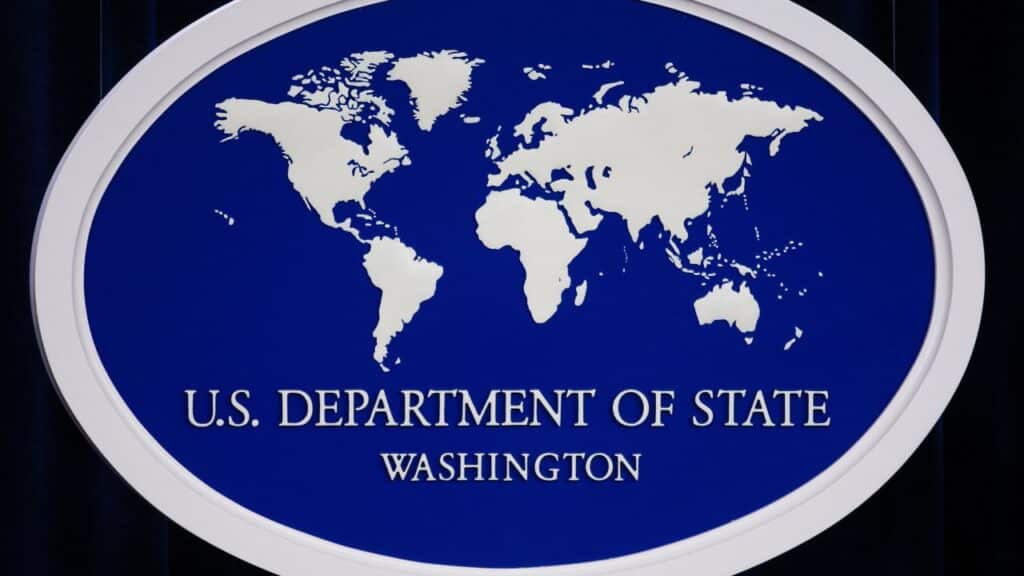
Backdrop for press briefings of US Department of State. Photo: Charles Dharapak/AP/File photo.

Orinoco Tribune – News and opinion pieces about Venezuela and beyond
From Venezuela and made by Venezuelan Chavistas

Backdrop for press briefings of US Department of State. Photo: Charles Dharapak/AP/File photo.
By Andrew Korybko – Jun 19, 2023
While seemingly disparate, each of these diplomatic engagements is indirectly connected to one another.
US Secretary of State Blinken just completed his trip to China, which was the first for any of America’s top diplomats in half a decade and the highest-profile one of the Biden Administration thus far. It came days before Bharatiya Prime Minister Modi’s visit to Washington and follows last week’s confirmation from the Iranian Foreign Ministry that their country held indirect talks with the US in Oman last month. While seemingly disparate, each of these diplomatic engagements is indirectly connected to one another.
For starters, they prove that the US is no longer able to go it alone like before during the heyday of unipolarity in the 1990s and early 2000s. Gone are the times where the US felt that it could ignore the interests of regional leaders like Bharat and Iran, not to mention speculatively aspiring superpower China. While it was already engaging with those three to various extents over the years, it hadn’t previously done so in what’s indisputably the present post-unipolar context that was just described.
The global systemic transition to multipolarity was unprecedentedly accelerated by Russia’s special operation in Ukraine and the NATO-Russian proxy war that followed that bloc sabotaging the Istanbul peace process in spring 2022. Instead of serving to restore unipolarity, these aforementioned developments and the West’s sanctions made multipolarity inevitable even though that emerging system hasn’t yet fully formed in all that clear of a manner.
North Korea Slams Blinken’s Recent China Visit as ‘Begging Trip’
The second point of commonality between these diplomatic engagements is that those three multipolar leaders are in much better positions vis-à-vis the US than they were prior to the onset of last year’s full-spectrum paradigm-changing events. China has weathered the worldwide economic storm that some thought its globalization-dependent model might not withstand, India solidified its strategic autonomy in the face of immense Western pressure, and the Iranian-Saudi rapprochement removed proxy war risks.
The US is therefore unable to apply the same levers of influence as before in an attempt to coerce them into making unilateral policy concessions at the expense of their objective interests and for the benefit of its own. China successfully adapted to the new global economic reality brought about by the West’s system-shaking anti-Russian sanctions, information warfare was shown to have zero effect on reshaping Bharat’s foreign policy, and Saudi Arabia no longer allows itself to be the US’ regional anti-Iranian proxy.
Finally, the last dot to connect is that these three countries are all very close Russian partners, thus suggesting that the US might be engaging them all around the same time right now because it hopes that they can be enticed into distancing themselves from Moscow. That’s a political fantasy, however, because each has enormous stakes in retaining their sovereignty, continuing to comprehensively expand mutually beneficial ties with Russia, and thus keeping the global systemic transition on track.
The best-case scenarios of the Sino-US rivalry stabilizing so that a war by miscalculation is no longer likely, Indo-US trade ties turbocharging the global economic recovery due to their complementarity, and/or a new nuclear deal being reached between Iran and the US would benefit everyone. These are all achievable if the US has the political will and realizes that it can no longer impose zero-sum demands onto those countries, both generally speaking and especially regarding their ties with Russia.
Diplomatic engagement is always positive as long as it isn’t aimed against any third party, which none of these examples are despite discredited speculation among some in the Alt-Media Community that Bharat is the US’ anti-Chinese proxy and its Trojan Horse in multipolar institutions. Neither China, Bharat, nor Iran is expected to sacrifice their sovereignty in exchange for something from the US, so nobody should fret about the latest developments since each of them would reject any deal that requires them doing so.

Andrew Korybko is an American Moscow-based political analyst specializing in the relationship between the US strategy in Afro-Eurasia, China’s One Belt One Road global vision of New Silk Road connectivity, and Hybrid Warfare. He is a frequent contributor to Global Research.